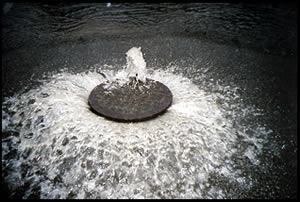Sanitary sewer overflow
Sanitary Sewer Overflow (SSO) is a condition where untreated sewage is discharged into the environment prior to reaching sewage treatment facilities. This can occur for various reasons, including blockages, line breaks, sewer defects that allow stormwater and groundwater to overload the system, and power failures. SSOs pose significant health and environmental risks, leading to the contamination of water bodies, potential exposure to pathogens, and can adversely affect wildlife.
Causes[edit | edit source]
The primary causes of SSOs include:
- Infiltration/Inflow: Excessive water from storm events or groundwater entering the sewer system through cracks, leaky manhole covers, or improperly connected storm drains can overwhelm the system.
- Blockages: Blockages in the sewer lines, often caused by fats, oils, grease (commonly referred to as FOG), roots, or other debris, can reduce the flow of sewage and lead to overflows.
- Sewer Defects: Aging infrastructure and poorly maintained pipes can collapse, break, or become disjointed, allowing sewage to escape.
- Power Failures: Pump stations that rely on electricity to move wastewater can fail during power outages, causing backups and overflows.
Health and Environmental Impacts[edit | edit source]
SSOs can have severe health and environmental impacts, including:
- Water Contamination: The release of untreated sewage can lead to the contamination of drinking water sources, rivers, lakes, and oceans, posing risks to public health and aquatic life.
- Disease Transmission: SSOs can contain pathogens such as bacteria, viruses, and parasites, which can cause diseases in humans and animals.
- Environmental Degradation: Nutrients in untreated sewage, like nitrogen and phosphorus, can lead to algal blooms that deplete oxygen in water bodies, killing fish and other aquatic organisms.
Prevention and Management[edit | edit source]
Efforts to prevent and manage SSOs include:
- Infrastructure Maintenance: Regular inspection and maintenance of sewer lines can help identify and rectify potential problems before they lead to SSOs.
- Capacity Enhancement: Upgrading sewer infrastructure to handle peak flows, especially in areas prone to heavy rainfall or rapid snowmelt, can reduce the risk of overflows.
- Public Education: Informing the public about the importance of not disposing of fats, oils, grease, and other harmful materials down the drain can help prevent blockages.
- Emergency Response Plans: Developing and implementing comprehensive emergency response strategies for SSO events can help mitigate impacts on public health and the environment.
Regulation[edit | edit source]
In many countries, SSOs are regulated under environmental protection laws. Entities operating sewer systems may be required to obtain permits, monitor for SSO events, and report any occurrences to regulatory agencies. Failure to comply with regulations can result in fines and other penalties.
This article is a environment-related stub. You can help WikiMD by expanding it!
Search WikiMD
Ad.Tired of being Overweight? Try W8MD's physician weight loss program.
Semaglutide (Ozempic / Wegovy and Tirzepatide (Mounjaro / Zepbound) available.
Advertise on WikiMD
|
WikiMD's Wellness Encyclopedia |
| Let Food Be Thy Medicine Medicine Thy Food - Hippocrates |
Translate this page: - East Asian
中文,
日本,
한국어,
South Asian
हिन्दी,
தமிழ்,
తెలుగు,
Urdu,
ಕನ್ನಡ,
Southeast Asian
Indonesian,
Vietnamese,
Thai,
မြန်မာဘာသာ,
বাংলা
European
español,
Deutsch,
français,
Greek,
português do Brasil,
polski,
română,
русский,
Nederlands,
norsk,
svenska,
suomi,
Italian
Middle Eastern & African
عربى,
Turkish,
Persian,
Hebrew,
Afrikaans,
isiZulu,
Kiswahili,
Other
Bulgarian,
Hungarian,
Czech,
Swedish,
മലയാളം,
मराठी,
ਪੰਜਾਬੀ,
ગુજરાતી,
Portuguese,
Ukrainian
Medical Disclaimer: WikiMD is not a substitute for professional medical advice. The information on WikiMD is provided as an information resource only, may be incorrect, outdated or misleading, and is not to be used or relied on for any diagnostic or treatment purposes. Please consult your health care provider before making any healthcare decisions or for guidance about a specific medical condition. WikiMD expressly disclaims responsibility, and shall have no liability, for any damages, loss, injury, or liability whatsoever suffered as a result of your reliance on the information contained in this site. By visiting this site you agree to the foregoing terms and conditions, which may from time to time be changed or supplemented by WikiMD. If you do not agree to the foregoing terms and conditions, you should not enter or use this site. See full disclaimer.
Credits:Most images are courtesy of Wikimedia commons, and templates, categories Wikipedia, licensed under CC BY SA or similar.
Contributors: Prab R. Tumpati, MD

